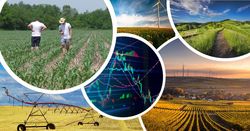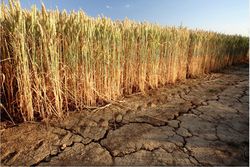Risk Management
Active risk management instead of passive reaction!
Farms are confronted with a multitude of uncertainties and risks. In particular, extreme weather events and strong price fluctuations present major challenges. Climate change and increasing interdependencies with other economic sectors and policy areas pose the threat that income fluctuations and economic risks for agricultural businesses will increase significantly.
Our aim is to develop information and decision-making tools for farmers and agricultural policy makers to further improve risk management in agriculture and to adapt it to future challenges, thus making it more "crisis-proof". Against this background, we analyse the significance and development of important risk factors and research farmers' behaviour in dealing with specific risks. We investigate the effectiveness and efficiency of measures to deal with risks, such as crop diversification, insurance, and hail protection nets. One focus of our work is on the possibilities and limits of state support for risk management. We are also working on improving the methodological prerequisites for comprehensive impact analyses. For economic analyses of risk management on farms, the farm accountancy data network represents one of the most important foundations for our work.
Risk management is a cross-sectional task that affects all areas and levels of agricultural enterprises and has close links to many research fields of the Thünen Institute. In addition, we cooperate with universities and research institutions nationally and internationally.
Dr. Frank Offermann co-ordinates the work on Risk Management.
Dr. Christoph Duden focuses on risk management in agriculture. In his scientific work he has dealt with the "measurement" of risk exposure, index insurance, farmers' risk behaviour and the modelling of risk behaviour in economic models.
Dr. Yaser Feizabadi is investigating how crop diversity can be optimised to make farms more resilient to extreme weather events, while increasing their contribution to climate change mitigation.
M. Sc. Mesud Heydarli is investigating how climate change affects yield variability and how fertilisation strategies can be further improved under these conditions.
Dr. Michel Danne Dr. Michel Danne untersucht, wie sich wirtschaftliche Rahmenbedingungen und die Zunahme von Ertragsschwankungen auf das Düngeverhalten landwirtschaftlicher UnternehmerInnen auswirkt und wie mit optimierten Düngestrategien das Risiko von hohen Stickstoffüberschüssen reduziert werden kann.
Dr. Jonas Schmitt examines the limits of on-farm risk management to cope with extreme weather events and the challenges for government support for off-farm risk management instruments such as weather insurance.








![[Translate to English:] Crop yield and optimized N fertilization in a changing climate](/media/_processed_/d/7/csm_2586_KlimaN_7d6e8d2547.jpg)
![[Translate to English:] Optimising crop production for climate protection](/media/_processed_/7/4/csm_2665__1086_Schoenhagen1_large_web_MichaelWelling_7c20a9f291.jpg)







